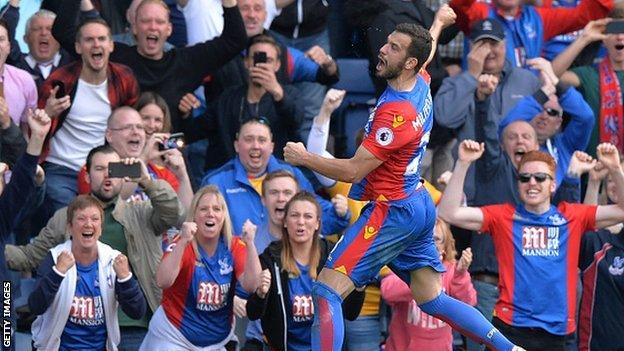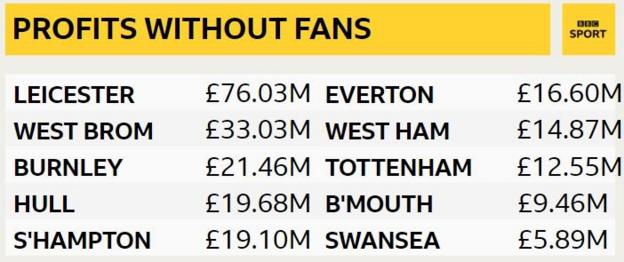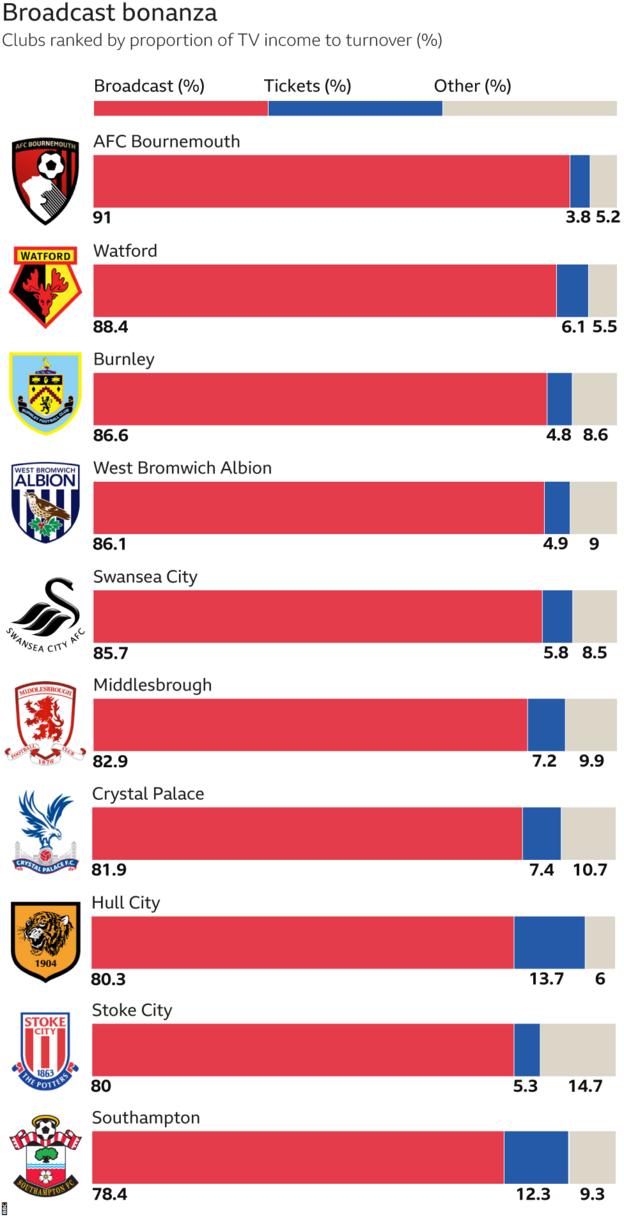Premier League: Crystal Palace, Tottenham, Swansea City and Hull stress importance of fans
Last updated on .From the section Football

"Without fans, the game is meaningless".
And Steve Parish knows better than most. The part-owner and chairman of Crystal Palace - the club he supported as a boy - stresses that in an age of broadcast billions, fans who file through the turnstiles remain the "lifeblood of the game".
"Who doesn't want to play in front of fans?" said the London entrepreneur, reacting to research by BBC Sport and BBC England's data unit which found Palace, along with 10 other top-flight clubs, could have played in empty stadiums and still made a pre-tax profit in the first season of the current TV deal.
"I certainly don't want to be in the vanguard of suggesting for a minute that we don't need supporters. Fans are the only ones that matter.
"They create all the intrigue, the interest and all the commercial value is generated first and foremost by those who love football and come to the stadium."

Those who fill Premier League stadiums are those who have also helped sell the game to the highest bidders.
"All revenue streams are interrelated - full stadiums create atmosphere which delivers TV revenues, which ensures investment in the matchday experience, which attracts sponsors and premium clients, and ultimately the ability to attract and afford talent - the virtuous circle of continuous investment," said a Tottenham spokesperson.
"As custodians of the club it is incumbent on us to ensure we maximise a diverse set of revenue streams, so we are not reliant on one - and everything we do is to fund our on-pitch performance."
Why ticket income makes a difference
So if full stadiums have driven TV income to a point that fans through the turnstiles make up just a fraction of the turnover, why are ticket prices not lower?
"That is a valid argument given the amount of money we get from TV," said Parish.
"We all work hard to strike a balance as you try to achieve as a club.
"Fans are the incremental difference between clubs. If you look at clubs that have consistently been above Palace in the league for the past 26 years, they are clubs who have generated larger matchday income, which is over and above the TV income that everybody shares.
"The more money you have to put on the pitch from generated income, the higher you finish in the league and the more money you get from your finishing position as well.
"An extra £20m or £30m every year, which is spent on the pitch, is a lot of money even when it comes to the TV income."

Hull City vice-chairman Ehab Allam, whose family owns the club and has a difficult relationship with supporters despite overseeing their most successful era, said the fanbase is "crucial".
"Speaking from the perspective of a smaller club that has yo-yoed in and out of the Premier League for the past decade, the fans are much more important to us compared to the bigger clubs," he told BBC Sport.
Fans have been critical of the Allams for their handling of the club's finances, sale of players, and efforts to restructure ticket prices, with the removal of concessionary tickets eliciting a particularly angry response.
Crowds at the KCOM Stadium have steadily declined since the club's controversial membership scheme was adopted in 2016.
Allam insists the East Yorkshire club, which has been up for sale since plans to rename the club 'Hull Tigers' were rejected by the Football Association in 2014, is "very healthy financially" and "fine adjusting to life in the Championship" despite receiving reduced parachute payments for the 2018-19 season.
Asked if controversial moves during their ownership has hurt support for the club, Allam said: "It hasn't helped. But the idea has always been to try to do the right thing for the long term, which we feel we are doing.
"The rebrand was to maximise the benefits of being in the Premier League and to achieve sustainability there. The idea was to use the brand to get the extra income from overseas markets, and that would have more than compensated for the difference we make on gates and could have reduced prices.
"A few years ago I said I'd like to increase the capacity of the stadium to 40,000 and reduce ticket prices to £5, which would have actually probably been achievable in the Premier League for a club of our size."
BBC's Price of Football 2017 study showed that Hull offered the cheapest adult single ticket and the second-cheapest season ticket in the Championship.
A balancing act for clubs
Following relegation from the Premier League, Swansea and West Brom reduced their prices, with the Swans also continuing to subsidise fans for away matches so they do not pay more than £20 for tickets.
Swansea chief operating officer Chris Pearlman said: "We are dependent on our supporters and they make a difference when we travel.
"We want as many people with us as possible and we want to make it as affordable as we can."
The balancing act for the Welsh club, Pearlman says, is a delicate one.
"You could charge more, but that creates a disconnect with supporters and is not worth it for the incremental money," added Pearlman, who also points out that merchandise sales and commercial deals are driven by fans attending matches.
"The reality for us, like many clubs, is that we were at 98% capacity over a number of years in the Premier League - we sold out of season tickets every single year and we could have generated more revenue.
"But it wasn't worth it because you want to make the team accessible to supporters and because TV revenue is so high you don't need to."



















